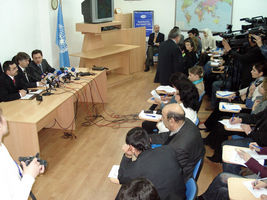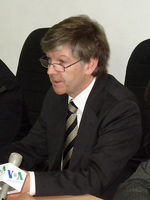|
|
TODAY.AZ / Politics
IDPs in Azerbaijan, no longer in headlines, still suffering
09 April 2007 [14:40] - TODAY.AZ
"I am leaving Azerbaijan with a mixed picture," said Walter Kallin, the UN Secretary-General’s Representative for the Human Rights of Internally Displaced Persons at the end of his mission to Azerbaijan.
 Having listened to displaced persons in different settlements, the Representative left with the impression that their basic needs had been addressed to a significant extent, but "what we need to do is really to refocus on this situation and take joint action at the international level to finally reach a peaceful resolution to the conflict."
Having listened to displaced persons in different settlements, the Representative left with the impression that their basic needs had been addressed to a significant extent, but "what we need to do is really to refocus on this situation and take joint action at the international level to finally reach a peaceful resolution to the conflict." 
Azerbaijan suffers from one of the most serious displacement problems in the world. Tens of thousands of displaced Azerbaijanis continue to live in run-down, overcrowded collective shelters with completely inadequate sanitary facilities. So many people have been displaced for so long, and "unfortunately it doesn’t look like there will be peaceful solution to the conflict in the very near future," noted Kallin.

The Representative said he was satisfied that some of the worst camps, where the displaced had spent over a decade in misery, had finally been closed, and that more dignified conditions had been constructed in new settlements. He welcomed the Government’s plan to shut down the remaining tent camps by the end of the year.

"Although to date, the efforts and achievements of the Government of Azerbaijan in addressing the problem of internal displacement are impressive, a number of challenges still lie ahead to improve the living conditions of the displaced populations," said the UN expert after visiting Baku, Sumgayit, Bilasuvar, Imishli and Sabirabad from April 2-6, 2007.
The main challenge now lies in the creation of livelihoods. Jobs were even more difficult to find than in the rest of the country, because settlements are often isolated from local markets, and employment in agriculture was not always an option. For this reason, Mr. Kallin stressed the importance of continued Government support, through monthly allowances and subsidies, for the victims of forced displacement
The Government has managed to provide access to schools for almost all displaced children, but the problem in many of these schools is poor quality of education with the need for improvement. On the other hand there are not enough adequate programs to address the mental health of IDPs. "No doubt that for many to be in displacement for such a long time, without any prospect and without a meaningful, productive life, it creates mental health problems that should be addressed," Kallin noted.
In the same vein, Mr. Kallin encouraged the authorities to strengthen and expand programs to increase the self-sufficiency of the displaced, and to give them a real chance of becoming active and productive members of society again. "Persons who have been dependent on external assistance for many years will hardly be able to muster the energy necessary to rebuild their towns and villages once they can return", he added. Experience in other countries has shown that solutions are more effective and sustainable if IDPs participate in return or resettlement planning from the outset.
After the visit Mr. Kallin will present a report on his findings and recommendations to the Human Rights Council and to the General Assembly.
"This is very important because the situation of the IDPs in Azerbaijan is no longer in the headlines and many IDPs feel forgotten and neglected and to a certain extent it’s true," Kallin said.
"I hope the first impact [of my report) will be that the Government will take up some of my recommendations and that it will get assistance and support from the international community in implementing these recommendations."
The displacement in Azerbaijan is linked to the still unsettled dispute over the future status of the Nagorno Karabakh region, fifteen years after the conflict with Armenia.
***
Walter Kallin was appointed to the post of Representative in 2004 at the recommendation of the United Nations Commission on Human Rights. In carrying out his mandate, he assesses, every year, the implementation of the human rights of internally displaced persons. Since his appointment, he has carried out several visits and country missions, including most recently missions to Colombia, Cote d'Ivoire, the Central African Republic, and Georgia.
URL: http://www.today.az/news/politics/39058.html
 Print version
Print version
Views: 2132
Connect with us. Get latest news and updates.
See Also
- 08 May 2025 [21:00]
Calculated continuity: Xi’s Moscow visit and future of global order - 08 May 2025 [15:33]
Azerbaijani, Turkmen FMs discuss bilateral co-op and regional issues - 08 May 2025 [15:05]
General Secretary To Lam concludes his state visit to Azerbaijan - 08 May 2025 [14:00]
Armenian breakfast: constitution with tea - 08 May 2025 [12:49]
Heydar Aliyev honored as architect of independent Azerbaijan - 08 May 2025 [12:07]
Spouse of General Secretary of Central Committee of Communist Party of Vietnam visits Icherisheher - 08 May 2025 [11:42]
Azerbaijani FM and Vietnam’s Deputy Prime Minister discuss strategic partnership - 08 May 2025 [10:41]
Nakhchivan representation honors National Leader Heydar Aliyev on 102nd birth anniversary - 08 May 2025 [09:57]
Conference in Shusha marks 102nd anniversary of National Leader Heydar Aliyev’s birth - 08 May 2025 [09:10]
Footage from GenSec To Lam’s visit to Azerbaijan posted on President Ilham Aliyev’s social media
Most Popular
 Public hearings resume in high-profile trial of Armenian citizens accused of war crimes
Public hearings resume in high-profile trial of Armenian citizens accused of war crimes
 Water Blackmail: A dirty game from Armenia to India
Water Blackmail: A dirty game from Armenia to India
 Left with nothing - mourning in Armenian organizations of the USA
Left with nothing - mourning in Armenian organizations of the USA
 Belarus donates special-purpose vehicle to support Aghdam's municipal services
Belarus donates special-purpose vehicle to support Aghdam's municipal services
 Armenia loves with ears: Armenian dreams of corridors
Armenia loves with ears: Armenian dreams of corridors
 Azerbaijani and Iraqi Foreign Ministers hold tête-à-tête meeting in Baghdad
Azerbaijani and Iraqi Foreign Ministers hold tête-à-tête meeting in Baghdad
 South Asia on brink: Can India's move ignite regional catastrophe
South Asia on brink: Can India's move ignite regional catastrophe
